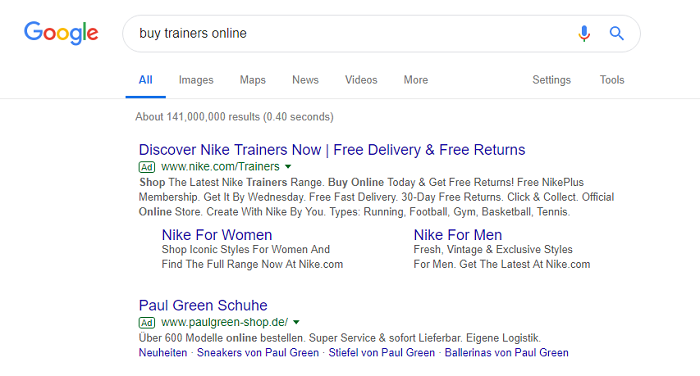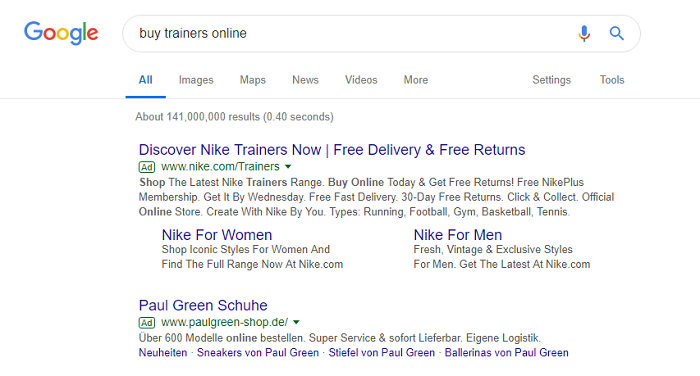Download our free digital marketing strategy guide 2019
When spending your budget on paid advertising, a false step will cost you. Many inexperienced marketers start their PPC campaigns not knowing the pitfalls and thinking some money and high-volume keywords are all they need.
If only.
Such thoughts will result in failure, and you won’t convert the money and time invested into the great ROI you deserve.
Fear not. In this blog, I’ll tell you about the five mistakes that will ruin a PPC campaign.
What is a PPC campaign?
Pay-per-click (PPC) ads are ads that you pay for every time a consumer clicks on them. There are several varieties, but the main type is the paid search ad. These are the sponsored search terms that appear at the top of a search engine results page.

An example of PPC ads for the keyword buy trainers online.
Creating ads is easy. But creating ones that work is the challenge. Here are the mistakes to avoid...
1. Not bothering with keyword research
What’s the main difference between PPC and SEO?
With SEO, you can’t pay to get high rankings in organic search. But with Google Ads, you can enter high-volume phrases you want to rank for, and your page will stay on the first page while you’re paying for it. Sounds easy, but it isn’t.
Once you decide on your PPC campaign, you have to begin with proper keyword research. Your campaign results depend on the keywords you select for it.
For instance, using general phrases such as ‘buy shoes’, ‘get sportswear’, etc., for your sports shop will drive you great click-through rate but poor conversion rate. Why? Users searching for ‘shoes’ usually have in mind the specific type or even brand they want to find. And when they click through your ad and don’t see what they expected, they return to the results and adjust their search query accordingly.
With this in mind, it’s better to select long-tail keywords for your paid campaign. These words are usually not that high-volume (as in, are searched for a lot), but they’re much better for your conversions and ROI. And as you pay-per-click, it’s crucial that your visitors turn into customers.
The process of collecting keywords for your PPC campaign includes the following stages:
Brainstorm the initial list. Think of the words best describing what you’re promoting. Look through your landing pages and select the relevant phrases from the content. Start from the broad terms (‘flowers’) and move towards the more specific ones (‘50 roses for 35$’).
Add synonyms and misspelled words.
I used Talkwalker’s Quick Search for brainstorming. By looking at the conversations your consumers are having around your industry and brand, you can identify the words and phrases they’re more likely to search for.

Identify the phrases related to new shoes in Quick Search, and find inspiration for your PPC campaign keywords.
2. Not analyzing your industry
Of course, you aren’t the only business in your marketplace, and many competitors are already running their marketing campaigns. They may have already made their mistakes, learned how to correct them, and built profitable strategies.
If you want your PPC campaign to succeed, spend some time analyzing the competition.
First, identify your competitors in a keyword search. Enter your target keyword or phrase into your search engines, and see what ads appear.
Some of them will be your competitors. I say ‘some,’ because if you search for ‘Samsung cases,’ for example, there will be ads for brands like Samsung or Walmart sites, among others. You need to disregard these and focus on real competitors.

This step helps you analyze ads shown for your query, and helps you understand how you should build yours.
However, this method is time-consuming, as you should check the whole list of keywords to collect several ad examples.
With Serpstat you can quickly discover the closest competitors based on the keywords they use, and see what their ads look like.
Type your main key phrase into your search box, select the country, and click on Search. In the Ad Examples section, see the list of ads popping up for your query keyword, and the phrases they also rank for.

Serpstat is a great tool for identifying your PPC keywords.
3. Limiting your budget
When you start your first pay-per-click campaign, you can’t be sure whether you’ve built the right strategy. So, you’ll probably set a tiny marketing budget. Less money, less risk, right?
If you think so, your campaign will definitely fail.
Nothing is profitable from the beginning. If your budget is limited, it’ll end before you see any conversions.
Increase your budget, target various keywords, get more clicks, and try to understand what ads drive the best conversions. After you’ve got some tangible results, slowly decrease the number of keywords you’re bidding on and start spending more on the most productive ones.
4. Your ad copy is more promising than the landing page
The most common mistake advertisers make is providing ad copy which isn’t relevant to the landing page. Some think driving prospects to their sites is the aim of their campaigns, and they’re guided by the ‘all is fair’ rule. That’s why consumers often see a disconnect between what you see in the ad, and the landing page content.
If you do this, you’ll see your click-through rate won’t correspond to your conversion rate. If you include ‘free shipping’ in your keywords and ad, but it’s only available in certain states or countries, people won’t respond to your call to action. You’ll waste your budget on clicks with few further conversions.


This discord between the ad placement and the conditions will negatively impact your conversion rate.
If you want to engage prospects and make them convert, think what you can offer them and mention it both in your ad and on your landing page.
5. Not testing your PPC campaign
A PPC campaign isn’t something you can start and then forget about. Not all things will work, and you should monitor your process regularly. Not every keyword is right for your campaign, and not every landing page design will drive sales. So, track your results, and improve when needed.
Try different strategies, don’t be afraid to take risks, and keep improving. Here are the aspects of the campaign you should experiment with to find your perfect tactics:
- Keywords. Start with the broad list of words relevant to your topic, and then analyze which are the most profitable. If the word drives several leads a month, why keep using it?
- Ads. What types of ads cause better conversions: the broad ones or the very specific? Think about it and optimize your ads for your audience’s needs.
- Landing page. Even if the prospect likes your offer, they may not respond to your landing page. Test different landing pages, designs, button positions, to see what drives better user experience.
Searched for "hootsuite." Saw an ad for Loomly. Look at this PPC ad. I have no idea what Loomly does, do you? I can only guess it's a competitor to Hootsuite. Tell customers what you do in five words. 101. This tweet was written before I clicked to reveal. pic.twitter.com/eGCblKaUpy
— Emily Binder (@emilybinder) September 12, 2018
Bonus tip: You can use Quick Search to monitor your social mentions. See how people discuss your ad on social for extra feedback.
Do PPC campaigns that succeed
Pay-per-click campaigns are a great way to increase your brand awareness and promote your product in search. The opportunity is there for you. Just make sure you avoid the pitfalls, and you’ll succeed.
Talkwalker: Thanks Inna. Fascinating stuff. We’re always looking for new ideas and inspiration to helps marketers in all aspects of the industry. If you want to boost your digital marketing prowess, you can download our 2019 digital marketing strategy below.




